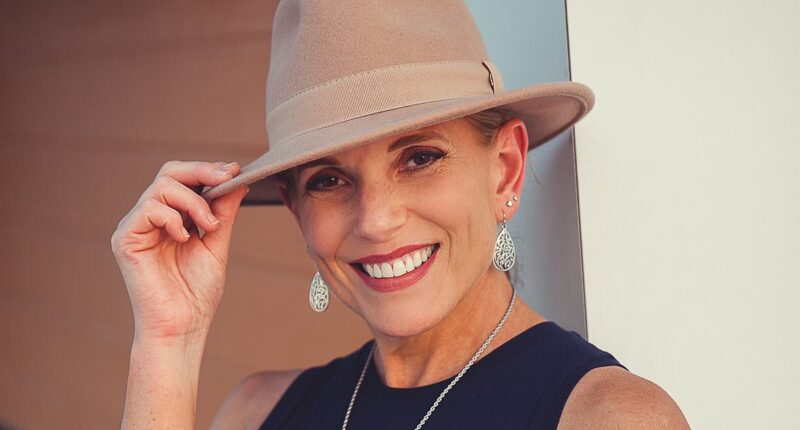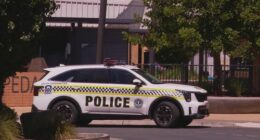Share this @internewscast.com
Nikki Langman was six-and-a-half years sober when she relapsed in a way she never saw coming – risking everything she’d fought so hard to rebuild.
At 47, she found herself relapsing into old habits despite having spent her recovery period guiding other addicts, overwhelmed by the stress of a new job and personal challenges.
“I was determined to maintain my sobriety, but eventually, my coping strategies proved insufficient. I needed just a little more,” Nikki explained.
‘I had to cleverly, cunningly try to find a way that I could get that relief without it really feeling like a relapse.’
It wasn’t a wild night out or a hidden bottle of spirits.
Instead, in a moment of madness at the supermarket, she bought and drank multiple bottles of vanilla essence – which contains 35 per cent alcohol.
Nikki’s journey to that moment began decades earlier – in a childhood marked by loneliness.
‘I didn’t think anyone noticed if I was around or not,’ she said.

Nikki Langman was six years sober when she relapsed in a way she never could have imagined

Nikki struggled with alcohol and substance abuse for 30 years
Originally from California but now residing in Melbourne, Nikki vividly recalls the burning sensation when she first tried alcohol at just seven years old after sneaking gin from her parents’ liquor cabinet.
She had watched adults transform at parties, convinced their ‘magic water’ was the secret to confidence and happiness.
“One afternoon after school, I waited until my parents were asleep before attempting the ‘magic water’ trick, believing that if it worked for them, perhaps it would work for me too,” she shared.
The experiment left her sick, but the incident was never discussed.
“I think my mom was scared of my dad discovering what I did, so she came in, tried to keep me quiet, cleaned everything up, and never mentioned it again.”
Reflecting on the past, Nikki suspects her issues worsened because there was no dialogue about alcohol, which was a completely routine part of her family life.
By 12, Nikki was a ‘full-blown alcoholic’, secretly drinking at school. Drugs followed – marijuana and cocaine – though she says she never enjoyed them.
‘I had a high IQ, I was considered gifted and talented, everyone had high expectations for me. Little did they know that inside I felt like I was dying. I had no goals or ambitions but I read a lot,’ she said.

‘I didn’t drink vanilla essence because I was stupid. I drank it because I was addicted and desperate. And if I can find that loophole, so can your teenager,’ warns Nikki
Her drinking escalated into her twenties. A serious fall while drunk left her with a broken back and a prescription for the opioid OxyContin, which soon became another addiction.
‘I was hooked instantly, I couldn’t get enough. But I didn’t tell anyone. It was like I had a free trip to Disneyland,’ Nikki said.
Alongside OxyContin and alcohol, Nikki became dependent on Valium and Xanax – benzodiazepines used to treat anxiety and insomnia. At the time, she was still living in the U.S., where such drugs are more readily prescribed.
‘I read everything I could get my hands on about new drugs and strengths that were coming out. I started mail-ordering prescriptions from Canada that weren’t available in the States. I was self-medicating and combining things that could have been potentially fatal. I don’t know why I’m alive now – someone wants me alive.’
After recovering from her back injury, she continued her education and started working in hospitality to put herself through university.
To keep accessing prescription drugs, she ‘doctor-shopped’ – visiting multiple healthcare providers to obtain controlled medications. Meanwhile, she continued climbing the corporate ladder.
Nikki would carry water bottles filled with clear spirits to her job, taking swigs in the bathroom and using strategies like eating garlic crackers to mask the smell of alcohol.
She tried rehab several times and managed stretches of sobriety – including abstaining throughout her pregnancy – but always relapsed.
At the peak of her addiction, Nikki was consuming a dangerous amount of vodka and prescription pills daily.
‘I would wake up with the shakes, drink vodka before work and had to drink while I was working. But I never had a hangover, had a high tolerance and wasn’t very social. I only drank at home and accepted I was going to die young,’ Nikki said.
‘The scariest thing wasn’t the pills or vodka, it was how I could function so well and no one called me out. I was killing myself right in front of people. It was an invisibility cloak and that terrifies me.’
Nikki’s rock bottom came in 2017 after her company went into administration.
Not having a job to go to every day only made things worse. She was no longer functioning or even eating, and the shakes were constant.
One day, her husband, who had been away visiting his parents, came home to find her lying on the floor. He said to her: ‘I’m going to come home one day and you’ll be dead. But I’ll know you didn’t mean to do it. You just got it wrong.’
It was a moment of clarity for Nikki. She didn’t want to die.
‘It was like every window and door just opened, and this, like, Arctic breeze came in. Every hair on my body just stood up. I said to my husband, “Take me to the emergency room.”‘
That hospitalisation marked the start of six and a half years of sobriety.
Nikki excelled during this stretch of recovery: she ran ultra marathons, took up karate, worked with the Rethink Addiction movement, wrote a book and became a professional speaker.
She describes herself during this period as ‘one of the most unlikely people to relapse’, and was seen as a role model of sobriety by others.
But things changed in 2023. Life got in the way, and her usual coping mechanisms weren’t cutting it anymore.
So, in a moment of madness, she went to the supermarket and bought a few bottles of vanilla essence – which contains 35 per cent alcohol – and drank them straight.
It didn’t feel like going to a liquor store or bar to buy vodka. It didn’t feel like a real relapse – even though that’s exactly what it was.
She continued to do this for months as the highly alcoholic vanilla essence ‘ripped up her insides’, causing gastrointestinal pain and reflux.
At a doctor’s appointment to manage the pain, Nikki’s physician realised she was intoxicated and ordered a blood test. Her alcohol reading came back at 0.3 – six times the legal driving limit in Australia.
That doctor, who had been treating Nikki for 13 years, remarked that she has ‘the potential to be addicted to anything’.
After that relapse, she went back to rehab for several months. She didn’t tell the other patients about her specific method of relapse to avoid giving them ideas.
Now Nikki hasn’t touched alcohol for a year and a half. She doesn’t even touch non-alcoholic varieties of beer, wine or spirits out of fear she’ll spiral again. Even the smell of Christmas trees reminds her of gin, so she avoids them.
One way she focuses on her recovery is by sharing her story.
Today, she is an international keynote speaker, author, coach and founder of UNBRICKABLE, a program that helps people to express what words can’t.
‘I’m using my story for good now, to educate, inspire and help others feel like they’re not alone in their struggles. I’m grateful to be an addict now because it gives me the opportunity to give back,’ Nikki said.
‘I don’t believe in weakness and failure isn’t a bad thing. You don’t have strengths and weaknesses, you just have behaviours and tendencies.’
As for the pantry staple that triggered her relapse, Nikki believes supermarket items that contain alcohol but aren’t kept in the liquor section – such as vanilla essence – should be stored behind glass cabinets for public safety.
‘I didn’t drink vanilla essence because I was stupid. I drank it because I was addicted and desperate. And if I can find that loophole, so can your teenager.’
If you need help, the Australian National Alcohol and Other Drug hotline (1800 250 015) provides free and confidential advice about alcohol and other drugs












